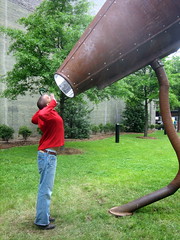 Image via Wikipedia
Image via Wikipedia
What a peculiar world we live in, where men will pay for fake foreplay with women they must not touch and who may well despise them. One wonders if they realise that the women are acting. That it's just a job. Or are they hypnotised by their hormones? Do they succumb to the fantasy that the woman entertaining them might actually want to mate with them?
Would it make a difference if they knew:
- that many women who go into the sex industry do so because they have been sexually abused and think that this is all they are worth;
- that the women have to pay to work in the club and are exploited financially by the club owners;
- that in places where clubs have opened, the incidence of rape in the vicinity of the club has gone up by as much as 50%;
- that lap dancers have reported a 100% sexual assault rate;
- that lap dancing clubs perpetuate an unhealthy image of women as mere sex objects; and
- that the women they are paying to see are someone's sister, someone's daughter, someone's wife?
Lucy, 19, works in a lap dancing club. She is a single mother, with a three year old daughter. The only way she can look after her daughter and earn some money is by working unsociable hours in a lap dancing club, when her mum can look after her little girl. She has to pretend to like the men she is dancing for but she doesn't. She hates being propositioned for 'extras' and being groped and she hates having to shave her genitals every night. It hurts! She hopes her daughter never has to go into an environment like this. She wants to stop working in the club and is looking for a way out.
Thanks to S.P.
Footnote: The provisions within the Policing and Crime Bill will reclassify lap dancing clubs as ‘sex establishments’ under Schedule 3 of the Local Government (Miscellaneous Provisions) Act 1982. This will give local communities a stronger say over the establishment and location of a lap dancing clubs and allow them to make objections on grounds wider than is currently allowed. Local people will be able to oppose an application if they have legitimate concerns that a lap dancing club would be inappropriate given the character of an area, for example, if the area was primarily a residential area. Local authorities will have the power to set a cap on the number of lap-dancing clubs that they think is appropriate for a particular area and impose a wider range of conditions on the licences.
![Reblog this post [with Zemanta]](http://img.zemanta.com/reblog_e.png?x-id=1bc72e1b-72ff-4f6f-af0c-e36cb5e5a34b)
![Reblog this post [with Zemanta]](http://img.zemanta.com/reblog_e.png?x-id=7704c05f-b9ef-4e87-af4e-b61983827d27)

![Reblog this post [with Zemanta]](http://img.zemanta.com/reblog_e.png?x-id=cffd69af-2969-4dfd-9187-9a512e48280e)

